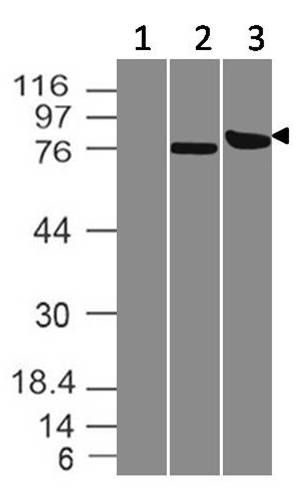Monoclonal Antibody to Trim29 (Clone: ABM43D2)

Figure-1: Western blot analysis of Trim29. Anti- Trim29 antibody (Clone: ABM43D2) was tested at 2 µg/ml on (1) HEK 293 cell lysate, (2) A431 cell lysate and (3) recombinant Trim29 protein expressed in HEK 293 cells.
Roll over image to zoom in
Shipping Info:
Order now and get it on Tuesday April 29, 2025
Same day delivery FREE on San Diego area orders placed by 1.00 PM
| Format : | Purified |
| Amount : | 100 µg |
| Isotype : | Mouse IgG2b Kappa |
| Purification : | Protein G Chromatography |
| Content : | 25 µg in 50 µl/100 µg in 200 µl PBS containing 0.05% BSA and 0.05% sodium azide. Sodium azide is highly toxic. |
| Storage condition : | Store the antibody at 4°C, stable for 6 months. For long-term storage, store at -20°C. Avoid repeated freeze and thaw cycles. |
TRIM29 (Tripartite motif-containing 29) is a member of the tripartite motif (TRIM) family of transcription factors, characterized by the conserved RING finger, B-box, and coiled-coil domains. The TRIM family has been implicated in a variety of physiologic processes including development, apoptosis and epithelial-mesenchymal transition (EMT). Depending on a tumor types, TRIM29 also may function as an oncogene or a tumor suppressor. As an oncogene, it facilitates tumor cell proliferation and invasion through stabilization of Beta-catenin. The mechanisms may also involve deactivation of p53 activity and promoting cell survival by inhibiting proapoptotic genes regulated by p53. As a histone binding protein TRIM29 is responsible for DDR (DNA damage response). It functions as a scaffold protein to assemble DNA repair proteins into chromatin followed by efficient activation of DDR. TRIM29 binds to modified histone H3 and H4 tails in the context of nucleosomes. Furthermore, chromatin binding of TRIM29 is required for the phosphorylation of H2AX nucleosomes and cell viability in response to ionizing radiation.
Western blot analysis: 1-2 µg/ml, Immunohistochemical analysis: 1 µg/ml
For Research Use Only. Not for use in diagnostic/therapeutics procedures.
| Subcellular location: | Cytoplasm |
| Post transnational modification: | Constitutively phosphorylated by PKC on serine/threonine in A431 cells. |
| Tissue Specificity: | Expressed in placenta, prostate and thymus. |
| BioGrid: | 117177. 112 interactions. |
|
There are currently no product reviews
|




















.png)











